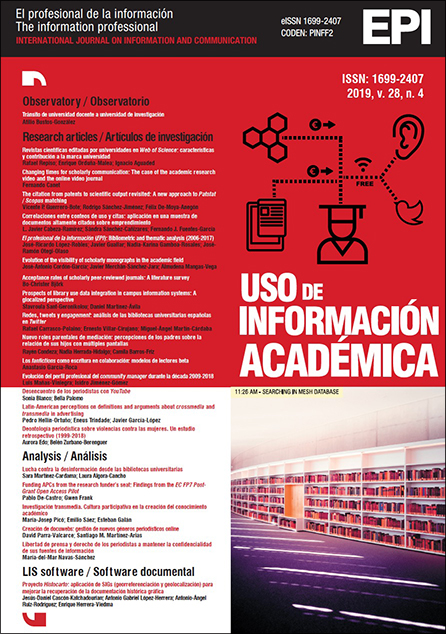Lucha contra la desinformación desde las bibliotecas universitarias
DOI:
https://doi.org/10.3145/epi.2019.jul.12Palabras clave:
Posverdad, Noticias falsas, Desinformación, Redes sociales, Medios, Bibliotecas universitarias, Bibliotecas académicas, Alfabetización informacional, Infomediación, España.Resumen
Se analiza el papel potencial que tienen las bibliotecas universitarias para concienciar sobre las noticias falsas y su problemática. Se lleva a cabo un estudio que permite conocer la actual labor y acciones desarrolladas por las bibliotecas universitarias españolas respecto a este fenómeno. Se aplicó un cuestionario a las 75 universidades tanto públicas como privadas existentes en España. La tasa de respuesta fue del 56%. Los resultados muestran preocupación por el fenómeno de la desinformación en la educación superior y destacan el necesario papel de las bibliotecas como agentes infomediarios. Este estudio constituye una aproximación basada en datos sobre la actual relación de las bibliotecas universitarias y el fenómeno de la posverdad en el marco bibliotecario español.
Descargas
Citas
ACRL (2016). Framework for information literacy for higher education. Association of College and Research Libraries. http://www.ala.org/acrl/standards/ilframework
Anderson, Rick (2017). "Fake news and alternative facts: five challenges for academic libraries". Insights, v. 30, n. 2, pp. 4-9. https://doi.org/10.1629/uksg.356
Álvaro, Sandra (2017). "Noticias falsas: compartir es curar". CCCB LAB. Investigación e innovación en cultura, 7 marzo. http://lab.cccb.org/es/noticias-falsas-compartir-es-curar
Banks, Marcus (2016). "Fighting fake news: How libraries can lead the way on media literacy". American libraries, 27 Dec. https://americanlibrariesmagazine.org/2016/12/27/fighting-fake-news
Batchelor, Oliver (2017). "Getting out the truth: The role of libraries in the fight against fake news". Reference services review, v. 45, n. 2, pp. 143-148. https://doi.org/10.1108/RSR-03-2017-0006
Burkhardt, Joanna M. (2017). "How fake news spread: Combating fake news in the digital age". Library technology reports, v. 53, n. 8, pp. 10-13. https://journals.ala.org/index.php/ltr/article/view/6498
Caulfield, Mike (2017). Web literacy for student fact-checkers. https://webliteracy.pressbooks.com
Caridad-Sebastián, Mercedes; Morales-García, Ana-María; Martínez-Cardama, Sara; García-López, Fátima (2018). "Infomediación y posverdad: el papel de las bibliotecas". El profesional de la información, v. 27, n. 3, pp. 891-898. https://doi.org/10.3145/epi.2018.jul.17
Collins Dictionary (2017). "The Collins word of the year 2017 is"¦ Fake news". Collins dictionary. https://www.collinsdictionary.com/word-lovers-blog/new/collins-2017-word-of-the-year-shortlist,396,HCB.html
Comisión Europea (2018). Final report of the High Level Expert Group on Fake News and Online Disinformation. https://ec.europa.eu/digital-single-market/en/news/final-report-high-level-expert-group-fake-news-and-online-disinformation
Corner, John (2017). "Fake news, post-truth and media - political change". Media, culture & society, v. 39, n. 7, pp. 1100-1107. https://doi.org/10.1177/0163443717726743
Cooke, Nicole A (2017). "Posttruth, truthiness, and alternative facts: Information behavior and critical information consumption for a new age". The library quarterly, v. 87, n. 3, pp. 211-221. https://doi.org/10.1086/692298
Farkas, Meredith (2018). "Beyond fake news: Determining what sources to trust". American libraries, 1 June. https://americanlibrariesmagazine.org/2018/06/01/beyond-fake-news
Finley, Wayne; McGowan, Beth; Kluever, Joanna (2017). "Fake news: An opportunity for real librarianship". ILA reporter, v. 35, n. 3, pp. 8-12. https://goo.gl/i4C1BV
IFLA (2017). "Alternative facts and fake news. Verifiabiblity in the information society". IFLA. https://blogs.ifla.org/lpa/2017/01/27/alternative-facts-and-fake-news-verifiability-in-the-information-society
Johnson, Ben (2017). "Information literacy is dead: The role of libraries in a post-truth world". Computers in libraries, v. 37, n. 2. http://www.infotoday.com/cilmag/mar17/Johnson--Information-Literacy-Is-Dead--The-Role-of-Libraries-in-a-Post-Truth-World.shtml
Lamb, Annette (2017). "Fact or fake? Curriculum challenges for school librarians". Teacher librarian, v. 45, n. 1, pp. 56-63. https://goo.gl/QeMdSD
Oxford Dictionaries (2016). "Word of the year 2016 is"¦ "˜post-truth´". English Oxford Living Dictionaries. https://languages.oup.com/press/news/2016/12/11/WOTY-16
Rochlin, Nick (2017). "Fake news: belief in post-truth". Library hi tech, v. 35, n. 3, pp. 386-392. https://doi.org/10.1108/LHT-03-2017-0062
Rose-Wiles, Lisa (2018). "Reflections on fake news, librarians, and undergraduate research". Reference & user services quarterly, v. 57, n. 3, pp. 200-204. https://doi.org/10.5860/rusq.57.3.6606
Shores, Mark (2018). "The alert collector: Collection development in an era of "fake news". Reference & user services quarterly, v. 57, n. 3, pp. 176-177. https://doi.org/10.5860/rusq.57.3.6601
Summers, Nick (2017). "Google will flag fake news stories in search results". Engadget, 4 July. https://www.engadget.com/2017/04/07/google-fake-news-fact-check-search-results/?guccounter=1
Stanford History Education Group (2016). Evaluating information: The cornerstone of civic online reasoning. Palo Alto: Stanford University. https://stacks.stanford.edu/file/druid:fv751yt5934/SHEG%20Evaluating%20Information%20Online.pdf
Vosoughi, Soroush; Roy, Deb; Aral, Sinan (2018). "The spread of true and false news online". Science, v. 359, n. 6380, pp. 1146-1151. https://doi.org/10.1126/science.aap9559
Zimdars, Melissa (2016). False, misleading, clickbait-y, and/or satirical "news" sources. https://docs.google.com/document/d/10eA5-mCZLSS4MQY5QGb5ewC3VAL6pLkT53V_81ZyitM/preview
Descargas
Archivos adicionales
Publicado
Cómo citar
Número
Sección
Licencia
Condiciones de difusión de los artículos una vez son publicados
Los autores pueden publicitar libremente sus artículos en webs, redes sociales y repositorios
Deberán respetarse sin embargo, las siguientes condiciones:
- Solo deberá hacerse pública la versión editorial. Rogamos que no se publiquen preprints, postprints o pruebas de imprenta.
- Junto con esa copia ha de incluirse una mención específica de la publicación en la que ha aparecido el texto, añadiendo además un enlace clicable a la URL: http://revista.profesionaldelainformacion.com
La revista Profesional de la información ofrece los artículos en acceso abierto con una licencia Creative Commons BY.




